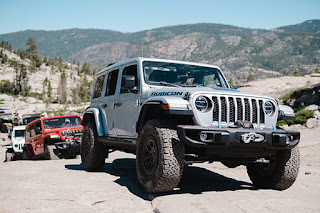Off-Roading Adventures: How to Prepare Your Pickup Truck
Introduction:
When it comes to thrilling outdoor adventures, off-roading is at the top of the list for many enthusiasts. The rugged terrains and challenging trails provide an adrenaline rush like no other. If you're planning an off-roading expedition with your trusty pickup truck, you've come to the right place. In this guide, we'll explore the essential steps to prepare your pickup truck for off-roading adventures. From safety measures to vehicle modifications, we've got you covered.
Subheading 1: Safety First
Off-roading can be a blast, but it's crucial to prioritize safety before embarking on any adventure. Here are some key safety measures to consider:
Inspect Your Pickup Truck: Before hitting the trails, give your truck a thorough inspection. Check the brakes, tires, suspension, and all fluid levels to ensure everything is in good working order.
Protective Gear: Always wear appropriate safety gear, including a helmet, gloves, and sturdy boots. Consider adding a roll cage or reinforced doors for added protection.
Emergency Kit: Pack an emergency kit that includes a first-aid supplies, basic tools, a fire extinguisher, and a recovery kit for when you get stuck.
Subheading 2: Tire Selection and Maintenance
Your choice of tires can make or break your off-roading experience. Here's what you need to know:
Off-Road Tires: Invest in quality off-road tires designed for the type of terrain you'll encounter. Mud-terrain, all-terrain, and rock-crawling tires are popular options.
Tire Pressure: Adjust your tire pressure according to the terrain. Lower pressure provides more traction in soft terrain like sand or mud, while higher pressure is suitable for rocky trails.
Spare Tire: Always carry a spare tire and the necessary tools to change it. Off-roading can be tough on tires, and flats are not uncommon.
Subheading 3: Suspension Upgrades
A robust suspension system is vital for off-roading. Consider these upgrades:
Lift Kit: A lift kit increases ground clearance, allowing your truck to tackle rough terrain without scraping the underside.
Heavy-Duty Shocks: Upgrading your shocks improves ride quality and stability on uneven surfaces.
Skid Plates: Install skid plates to protect the undercarriage from rocks and debris.
Subheading 4: Four-Wheel Drive and Differentials
To conquer challenging trails, it's essential to understand and optimize your pickup's four-wheel drive system and differentials:
Engage 4WD: Learn how to engage and disengage your truck's 4WD system effectively. Use 4WD on rough terrain and switch back to 2WD on smooth surfaces to save fuel.
Locking Differentials: If your truck has locking differentials, use them to improve traction when necessary.
Subheading 5: Lighting and Recovery Gear
Visibility and recovery tools are essential for off-roading:
Auxiliary Lighting: Install extra lighting, such as LED light bars or spotlights, to improve visibility during nighttime or low-light conditions.
Recovery Gear: Carry essential recovery gear like tow straps, shackles, a winch, and a high-lift jack to get out of tricky situations.
Subheading 6: Know Your Limits
Off-roading can be incredibly fun, but it's crucial to know your limits and the capabilities of your pickup truck. Start with easier trails and gradually work your way up to more challenging terrain as you gain experience.
Conclusion:
Preparing your pickup truck for off-roading adventures is a mix of safety, maintenance, and customization. By following the steps outlined in this guide, you'll be well-equipped to tackle rugged trails and create unforgettable memories on your off-roading expeditions. Remember to prioritize safety, invest in the right equipment, and always respect the environment and fellow off-roaders. Happy off-roading!

Comments
Post a Comment